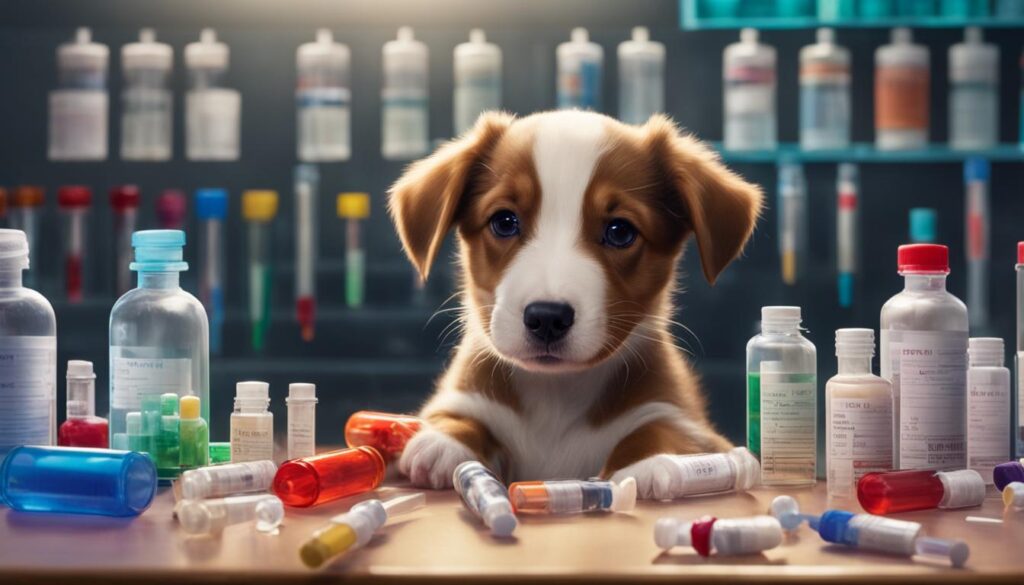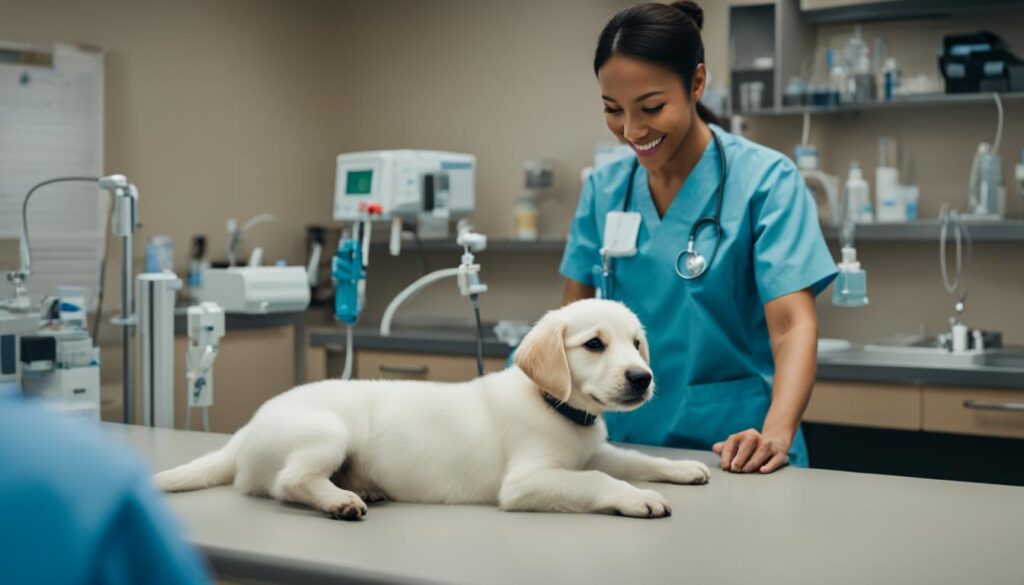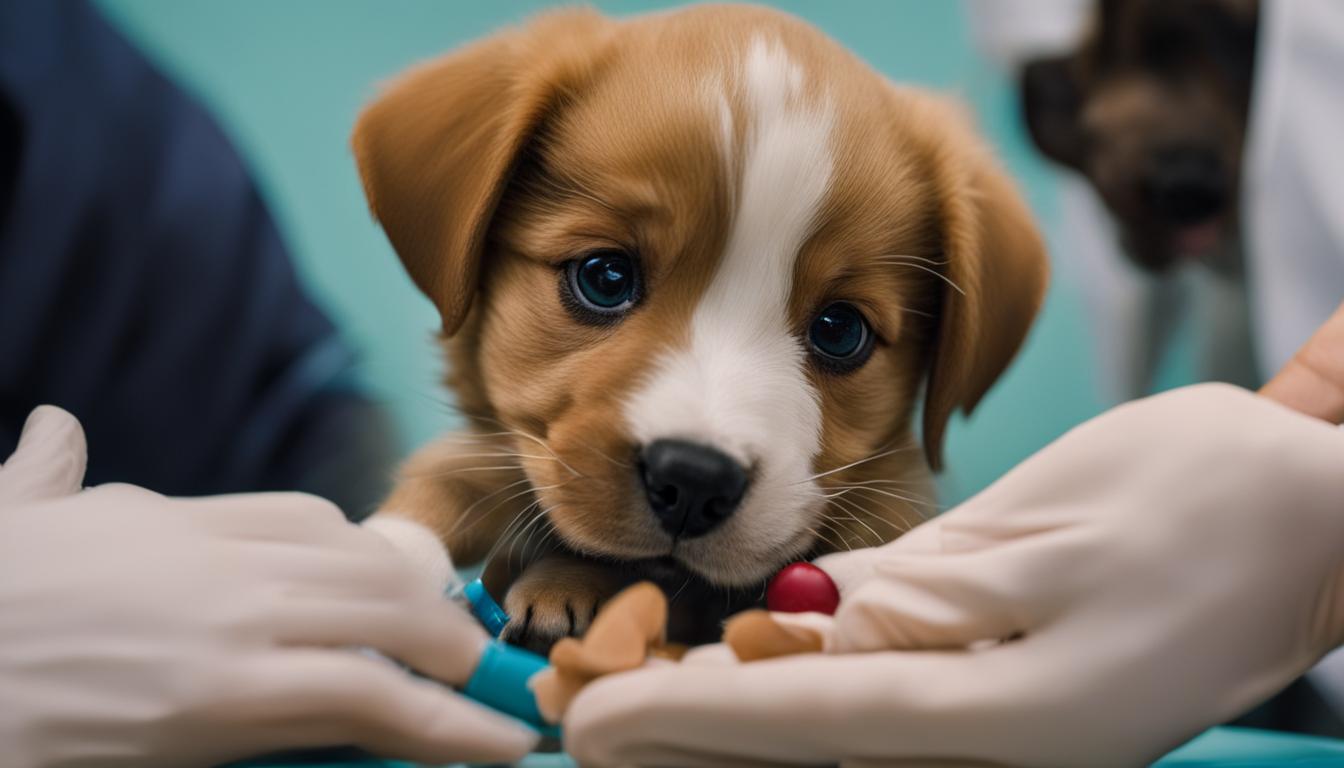As a responsible pet owner, it’s crucial to understand the importance of puppy shots in protecting your young pet from dangerous diseases. Vaccinations play a vital role in building your puppy’s immune system and safeguarding their overall health and wellbeing. Knowing which shots are needed and following a proper vaccination schedule is key to ensuring your puppy grows up happy and healthy.
- Understanding Core Puppy Vaccinations
- Exploring Non-Core Puppy Vaccinations
- Understanding Specific Puppy Diseases and Vaccinations
- Puppy Vaccination Schedule
- The Importance of Regular Veterinary Care
- The Cost of Puppy Vaccinations
- Ensuring Vaccine Safety
- The Role of Vaccines in Controlling Diseases
- Conclusion
- FAQ
- Source Links
Key Takeaways:
- Understanding the recommended vaccines for puppies is essential in providing them with the best protection against diseases.
- Core puppy vaccinations, such as the DHPP vaccine and rabies vaccine, are highly recommended for all puppies.
- Non-core vaccinations may be recommended based on your puppy’s lifestyle and risk factors.
- Adhering to a proper puppy vaccination schedule is crucial for their long-term health.
- Regular veterinary care, including vaccinations, is essential for your puppy’s overall well-being.
Understanding Core Puppy Vaccinations
When it comes to protecting your young puppy from dangerous diseases, core vaccinations are essential. These primary vaccines provide crucial protection against common and severe illnesses that can severely impact your puppy’s health and well-being.
The DHPP vaccine is one of the core vaccinations recommended for all puppies. It protects against distemper, hepatitis, parvovirus, and parainfluenza. Distemper is a highly contagious and potentially deadly disease that affects the respiratory and nervous systems.
Rabies is another core vaccine that is required by law in most states. This vaccine protects against the rabies virus, which can be transmitted to humans and is fatal if left untreated. By ensuring that your puppy receives the core vaccinations, you are providing them with a strong immune system and protecting them from life-threatening diseases.
Why Core Vaccinations are Important
Core vaccinations are crucial because they protect against diseases that are highly contagious, severe, and potentially fatal. By ensuring that your puppy receives these essential shots, you are not only safeguarding their health but also contributing to the overall well-being of the dog population.
These vaccinations create a barrier of protection that helps prevent the spread of diseases like distemper, hepatitis, parvovirus, and rabies. By keeping up with your puppy’s core vaccination schedule, you are taking an important step in providing them with a healthy and happy life.
Table: Core Puppy Vaccinations
| Vaccine | Disease Protection | Vaccination Schedule |
|---|---|---|
| DHPP | Distemper, Hepatitis, Parvovirus, Parainfluenza | Start at 6-8 weeks, boosters every 2-4 weeks until 12-16 months |
| Rabies | Rabies virus | Start at 12-16 weeks, boosters as required by law |
Consult with your veterinarian to determine the specific core vaccination schedule for your puppy based on their individual needs, geographic location, and lifestyle. Remember, core vaccinations are an essential part of responsible pet ownership and a key aspect of ensuring your puppy grows into a healthy and happy adult dog.
Exploring Non-Core Puppy Vaccinations
When it comes to protecting your puppy’s health, vaccinations play a crucial role. While core vaccines are essential for all puppies, non-core vaccinations are optional but may be recommended based on your puppy’s lifestyle and risk factors. These non-core vaccines provide additional protection against specific diseases that your puppy may be at risk for.
Some of the non-core vaccines that may be recommended for your puppy include:
- Bordetella: Also known as kennel cough, this vaccine protects against a highly contagious respiratory infection that can spread in areas where dogs interact closely.
- Leptospirosis: This vaccine protects against a bacterial infection that can be transmitted through contaminated water, soil, or contact with infected animals. It is particularly important for puppies who spend time outdoors or in areas where the disease is prevalent.
- Lyme disease: If you live in an area where ticks are prevalent, your veterinarian may recommend the Lyme disease vaccine. This vaccine helps protect against the tick-borne illness that can cause fever, joint pain, and other symptoms.
- Canine influenza: This vaccine protects against the canine influenza virus, which can cause respiratory symptoms similar to kennel cough. It may be recommended if your puppy will be in close contact with other dogs, such as in boarding facilities or dog parks.
It’s important to discuss with your veterinarian which non-core vaccines are appropriate for your puppy based on their individual needs and potential exposure. Your vet will consider factors such as your puppy’s age, lifestyle, and the prevalence of specific diseases in your area. By understanding the risks and benefits of non-core vaccinations, you can make informed decisions to protect your puppy’s health.

The Benefits of Non-Core Vaccinations
While non-core vaccinations are not necessary for all puppies, they can provide added protection against specific diseases based on your puppy’s potential exposure and activities. Investing in these vaccines can help safeguard your puppy’s health and give you peace of mind knowing that they are protected against a wider range of illnesses.
It’s important to remember that even if a non-core vaccination is not recommended for your puppy, it does not mean they are at increased risk for the associated disease. Your veterinarian is the best source of information and guidance when it comes to determining which vaccines are necessary for your puppy’s overall health.
By staying proactive and keeping your puppy up to date on both core and recommended non-core vaccinations, you are taking important steps to ensure their long-term health and well-being.
Understanding Specific Puppy Diseases and Vaccinations
Vaccinations play a crucial role in protecting puppies against specific diseases. By ensuring your puppy receives the necessary shots, you can safeguard their health and prevent the spread of dangerous illnesses. There are several key diseases that puppies need to be protected against, including canine distemper, parvovirus, and rabies.
Canine Distemper
Canine distemper is a highly contagious disease that affects the respiratory, gastrointestinal, and nervous systems of dogs. It can cause symptoms such as fever, coughing, vomiting, diarrhea, and even seizures. Distemper can be fatal, particularly in young puppies who have not been vaccinated. Vaccination is the most effective way to prevent the spread of this disease and protect your puppy’s health.
Parvovirus
Parvovirus is another highly contagious and potentially fatal disease that primarily affects the gastrointestinal system. It can cause severe vomiting, diarrhea, dehydration, and damage to the puppy’s intestines. Puppies are particularly susceptible to parvovirus, and it can be spread through contact with infected dogs or contaminated environments. Vaccination is essential to protect your puppy from this deadly virus.
Rabies
Rabies is a viral disease that attacks the central nervous system and is transmissible to humans. It is a fatal disease that can be contracted through the bite of an infected animal. Rabies vaccinations are required by law in most states and are essential to protect both your puppy’s health and public health. Vaccinating your puppy against rabies is not only a legal obligation but also a crucial step in preventing the spread of this dangerous disease.
By understanding the specific diseases that puppies are at risk for and the importance of vaccinations, you can take proactive steps to protect your puppy’s health and ensure their overall well-being. Consult with your veterinarian to determine the appropriate vaccination schedule and ensure that your puppy receives the necessary shots to stay healthy and safe.
| Disease | Symptoms | Prevention |
|---|---|---|
| Canine Distemper | Fever, coughing, vomiting, diarrhea, seizures | Vaccination |
| Parvovirus | Severe vomiting, diarrhea, dehydration | Vaccination |
| Rabies | Aggression, paralysis, foaming at the mouth | Vaccination |

Puppy Vaccination Schedule
Ensuring your puppy receives the necessary shots at the right time is crucial for their health and protection against diseases. The puppy vaccination schedule typically begins when your puppy is 6-8 weeks old and continues until they are 12-16 months old. During this time, several rounds of vaccinations will be administered, with boosters given every 2-4 weeks.
The specific timing and vaccines needed may vary based on your puppy’s risk factors, geographic location, and lifestyle. It’s important to consult with your veterinarian to determine the optimal vaccination schedule for your puppy’s individual needs. They will consider factors such as breed, environment, potential exposure to certain diseases, and local regulations.
Here is a general guideline for the puppy vaccination schedule:
| Vaccine | Age | Booster |
|---|---|---|
| DHPP | 6-8 weeks | 2-4 weeks after initial dose |
| Rabies | 12-16 weeks | 1 year after initial dose |
| Bordetella | 12-16 weeks | Annually |
| Leptospirosis | 12-16 weeks | Annually |
| Lyme Disease | 12-16 weeks | Annually |
This table provides a general overview of common vaccines and their recommended timing. However, it’s important to remember that your veterinarian may adjust the schedule based on your puppy’s specific needs.
Following the vaccination schedule and ensuring your puppy receives all necessary shots will help protect them from dangerous diseases and lay the foundation for a healthy and happy life.

The Importance of Regular Veterinary Care
Proper veterinary care is essential for the overall health and well-being of your puppy. Beyond vaccinations, regular visits to the vet provide a range of important services to ensure your puppy’s optimal health. Wellness exams, for example, allow the vet to monitor your puppy’s growth and detect any health issues early on. These exams also provide an opportunity for your vet to discuss necessary vaccinations and preventive care measures specific to your puppy’s needs.
In addition to vaccinations, your veterinarian can also provide parasite prevention treatments to protect your puppy from fleas, ticks, and other harmful parasites. Dental care is another crucial aspect of regular veterinary care, as it promotes good oral hygiene and helps prevent dental diseases in the future.
Building a strong relationship with your veterinarian is key to providing your puppy with the best possible care. Regular check-ups and open communication with your vet ensure that your puppy receives personalized care based on their individual needs, lifestyle, and risk factors.

Key Benefits of Regular Veterinary Care:
- Early detection of health issues
- Guidance on necessary vaccinations
- Parasite prevention and control
- Proper dental care
- Personalized care based on individual needs
Quote:
Regular veterinary care is not just about getting your puppy the necessary shots; it’s about ensuring their overall wellbeing and addressing any potential health concerns proactively. Your veterinarian is your trusted partner in providing the best care for your furry friend.
| Benefits of Regular Veterinary Care | Why it Matters |
|---|---|
| Early detection of health issues | Allows for timely treatment and prevention of potential complications |
| Guidance on necessary vaccinations | Ensures your puppy receives the appropriate vaccines for their specific needs and risk factors |
| Parasite prevention and control | Protects your puppy from harmful parasites that can cause various diseases |
| Proper dental care | Promotes good oral hygiene, preventing dental diseases and discomfort |
| Personalized care based on individual needs | Your puppy’s unique requirements and lifestyle factors are taken into consideration for tailored care |
By prioritizing regular veterinary care for your puppy, you are taking proactive steps to ensure their long-term health and happiness. Remember to schedule routine check-ups, follow your veterinarian’s recommendations, and maintain a strong partnership with your vet for the best possible care.
The Cost of Puppy Vaccinations
When it comes to the health of your furry friend, getting them the necessary shots is crucial. However, understanding the cost of puppy vaccinations is also an important consideration. The cost can vary depending on factors such as your location, the type of vaccine, and the veterinary clinic you visit.
On average, you can expect to pay between $75 to $100 for core vaccinations for your puppy. These core vaccinations typically include the DHPP vaccine, which protects against distemper, hepatitis, parvovirus, and parainfluenza, as well as the rabies vaccine, which is required by law in most states. It’s important to note that additional non-core vaccines may incur extra costs.
While the cost of vaccinations is an important factor to consider, it’s vital to prioritize your puppy’s health and ensure they receive the necessary shots for their overall well-being. Vaccines play a crucial role in protecting puppies from dangerous and potentially deadly diseases, and investing in their health now can save you from costly veterinary bills in the future.
Vaccination Cost Comparison
| Vaccine | Average Cost |
|---|---|
| DHPP (Core Vaccine) | $75 – $100 |
| Rabies (Core Vaccine) | $15 – $25 |
| Bordetella (Non-Core Vaccine) | $15 – $35 |
| Leptospirosis (Non-Core Vaccine) | $25 – $45 |
The table above provides a sample cost comparison for core and non-core vaccinations. Keep in mind that prices may vary between different veterinary clinics and regions. It’s always best to consult with your veterinarian to get an accurate estimate of the cost for your specific puppy’s vaccination needs.
Remember, while the cost of puppy vaccinations is important, the health and well-being of your furry friend should be the top priority. By providing them with the necessary shots, you are protecting them from potentially life-threatening diseases and ensuring a long and healthy life together.
Ensuring Vaccine Safety
When it comes to puppy immunization, ensuring vaccine safety is of utmost importance. Vaccines are designed to protect your puppy from serious diseases, but it’s essential to take the necessary precautions to ensure that the vaccines are administered safely and effectively.
To ensure vaccine safety, it is crucial to have your puppy’s vaccines administered by a licensed veterinarian. Veterinarians have the expertise and training to handle and administer vaccines correctly. They will also be able to provide guidance on the appropriate vaccines for your puppy based on their age, breed, and lifestyle.
It is also important to acquire vaccines from reputable sources. Vaccines should be stored and transported at the correct temperature to maintain their efficacy. Using vaccines from trusted sources minimizes the risk of contamination or improper handling.
While adverse reactions to vaccines are rare, it’s important to remain vigilant. Monitor your puppy after vaccination for any signs of discomfort or adverse reactions. If you have any concerns or questions about vaccine safety, don’t hesitate to discuss them with your veterinarian. They will be able to address your concerns and ensure your puppy’s safety and well-being.
Important Points:
- Have vaccines administered by a licensed veterinarian for proper handling and administration.
- Acquire vaccines from reputable sources to ensure quality and efficacy.
- Monitor your puppy for any adverse reactions after vaccination.
- Discuss any concerns or questions about vaccine safety with your veterinarian.
The Role of Vaccines in Controlling Diseases
Vaccines play a crucial role in controlling and preventing the spread of infectious diseases in puppies. By ensuring that your puppy receives the necessary shots, you are not only protecting their health but also contributing to the overall public health and well-being of the dog population.
Vaccinations are designed to stimulate your puppy’s immune system to recognize and fight off specific diseases. By introducing a small, harmless portion of the disease-causing agent into their body, vaccines help train their immune system to mount a rapid and effective response if they ever encounter the actual disease. This immune response can prevent the disease from taking hold or reduce its severity, keeping your puppy healthy and safe.
By vaccinating your puppy, you are not only protecting them but also other dogs they may come into contact with. Vaccinated puppies are less likely to contract and spread diseases, helping to control outbreaks and reduce the overall prevalence of dangerous conditions such as distemper, parvovirus, and rabies. Vaccinations are a critical component of responsible pet ownership and a key factor in maintaining a healthy and thriving canine population.
Regularly following your puppy’s vaccination schedule, as recommended by your veterinarian, is essential for ensuring their protection against common diseases. Your vet will determine the appropriate vaccines and timing based on factors such as your puppy’s breed, age, lifestyle, and risk factors. It’s important to consult with your vet to create a tailored vaccination plan to meet your puppy’s specific needs.
Remember that vaccines are not a one-time solution; they require follow-up boosters to maintain your puppy’s immunity. It’s crucial to keep up with your puppy’s vaccination schedule to ensure continuous protection throughout their early years. By doing so, you are taking proactive steps to safeguard your puppy’s health and well-being, setting them up for a long and happy life.
Conclusion
Ensuring your puppy receives the necessary shots is an important responsibility as a pet owner. By following a proper puppy vaccination schedule, you can provide essential protection against dangerous diseases and safeguard your puppy’s health and well-being.
Remember that essential puppy shots, such as the DHPP vaccine and rabies vaccine, are considered core vaccinations and are highly recommended for all puppies. These vaccines provide crucial immune system support and help protect against common and severe illnesses.
In addition to core vaccinations, there are non-core puppy vaccinations that may be recommended based on your puppy’s lifestyle and risk factors. Consulting with your veterinarian will provide guidance on necessary shots for puppies, ensuring your furry friend receives the optimal level of protection.
Investing in your puppy’s vaccinations is an investment in their future. Prioritize their health and happiness by staying up to date with their vaccination schedule and maintaining a strong relationship with your veterinarian to ensure your puppy receives the essential care they need.
FAQ
What puppy shots are needed for young pets?
The recommended vaccines for puppies include distemper, parvovirus, adenovirus, and parainfluenza (DHPP) as well as vaccines for bordetella, leptospirosis, lyme disease, and rabies.
What are core puppy vaccinations?
Core puppy vaccinations, such as the DHPP vaccine and rabies vaccine, are highly recommended for all puppies as they protect against common and severe diseases and provide crucial protection for their immune systems.
What are non-core puppy vaccinations?
Non-core puppy vaccinations, such as vaccines for bordetella, leptospirosis, lyme disease, and canine influenza, are optional but may be recommended based on your puppy’s lifestyle and risk factors.
What diseases do puppy vaccinations protect against?
Puppy vaccinations protect against diseases such as canine distemper, parvovirus, and rabies, which can be highly contagious, potentially fatal, and pose a threat to public health.
What is the puppy vaccination schedule?
The puppy vaccination schedule typically starts at 6-8 weeks of age and continues until 12-16 months old, with multiple rounds of vaccinations and boosters given every 2-4 weeks.
How important is regular veterinary care for puppies?
Regular veterinary care is vital for the overall health and wellbeing of puppies and includes essential services such as vaccinations, wellness exams, parasite prevention, and dental care.
How much do puppy vaccinations cost?
The cost of core vaccinations can range from $75 to $100, with additional costs for non-core vaccinations. However, prioritizing your puppy’s health and wellbeing should be the main consideration.
Is vaccine safety a concern for puppy immunization?
Vaccine safety is a top concern, and it is important to have vaccines administered by a licensed veterinarian, ensure proper handling and administration, and discuss any concerns or risks with your vet.
What is the role of vaccines in controlling diseases in puppies?
Vaccines play a crucial role in controlling the spread of infectious diseases in puppies, reducing the incidence of diseases such as distemper, parvovirus, rabies, and others, and keeping puppies and other dogs safe and healthy.
How do puppy vaccinations contribute to long-term health?
By following a recommended vaccination schedule, you can protect your puppy from dangerous diseases, provide them with a strong immune system, and invest in their future health and happiness.




